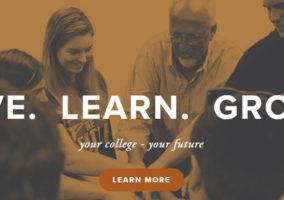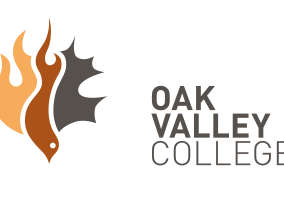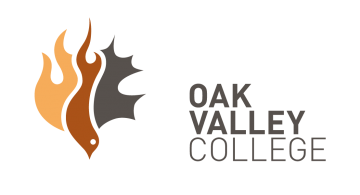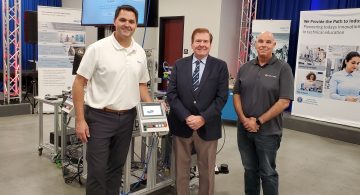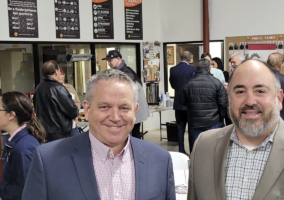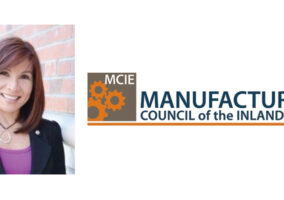Building Futures with Career Education
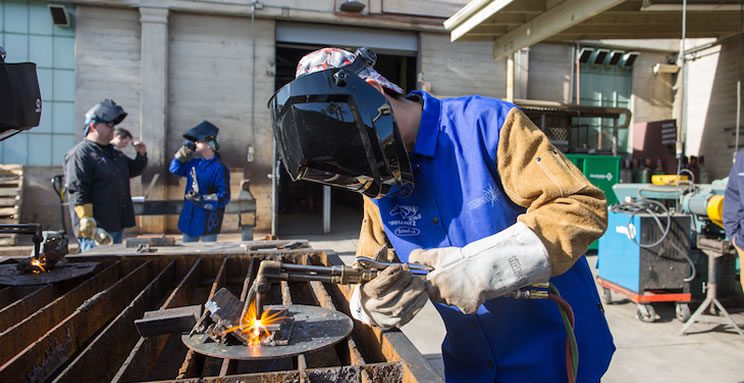
Norco, CA – Throughout Riverside and San Bernardino counties, industry-specific, career education training programs working hard to prepare students to fill the 1 million in-demand, “middle-skilled” jobs that will be needed throughout the state in coming years. As part of that effort, California’s Strong Workforce Program is providing $200 million annually to support career education at the state’s 114 community colleges.
Ever since he discovered Legos as a child, Norco High School senior Logan Ibbetson has been obsessed with building and design. Recently, he came within a blown circuit from blowing out the competition at a SkillsUSA competition—he and his team had created a robot that could enter a room and dispose of an explosive device.
Now interested in manufacturing and engineering, Ibbetson’s next stop will be Norco College’s Accelerated Certificate & Employment (ACE) program where he will focus on industrial automated technology.
“I love building things,” said Ibbetson, who has been drawn to career education courses such as robotics, three-dimension wood design, and sculpture.
More SkillsUSA News
- Nine Riverside City College Students Qualified SkillsUSA Competition
- Riverside City College Students Win Three Medals at SkillsUSA National Championship
- Two Students Place at SkillsUSA National Competition
As great as Ibbetson’s story is, it is not unique. He is among the large number of high school students who are opting to pursue career education at community colleges after exploring their career and technical education options in high school. According to a 2016 Brookings Institution report, this is a good thing. “Survey after survey tells us that employers can’t find people with the skills they need to fill today’s jobs, especially middle-skill technical jobs in fields like IT, health care, and advanced manufacturing.”
According to Chris Piercy, a political science teacher at Serrano High School in Phelan, and an adjunct instructor at Victor Valley College, “Not everybody wants to or can afford to go to a four-year university.”
Piercy is among those in the high school and community college ranks working with businesses and industry professionals to help expose students to the benefits of career education. Piercy helped spearhead a K16 Bridge Program designed by K-12 and community college teachers and administrators to create a pathway from high school to a community college and on to a career. Last year, according to Piercy, more than 2,000 graduating high school students in the High Desert opted to enroll at Victor Valley Community College and pursue career education options.
Ibbetson figures he’ll be able to get a good job in a high-demand field less than a year after enrolling at Norco College. More importantly, because of Norco College’s affordability and the fact that he’ll be able to work at the same time, he’ll be debt free. That will enable him to save money to pursue a bachelor’s degree and find an even better job down the line.
“This kind of pathway is appealing,” says Ibbetson. “You can build up your skills, get a job, and map out your next plan of action, which may or may not mean coming back to college and earning an advanced degree. It makes a lot of sense.”
Gina Boster, director of career education at the Corona-Norco Unified School District, agrees. “The Corona-Norco Unified School District believes all students are capable of graduating from high school as college and career ready.”
“As educators, the goal is to prepare our students for the customer: business and industry,” says Boster. “In the Inland Empire, there is a skilled labor shortage and for those individuals with the appropriate credentials many opportunities exist in high-growth, high-wage jobs in industry sectors such as distribution and transportation, construction, and health care.”
Like Ibbetson, Brittany Gamar, a career education success story and Riverside resident, is a case in point. After attending the Business Academy at La Sierra High School, Gamar later enrolled at California Baptist College where the career education skills she learned helped her build a career as a recruiter for companies large and small.
“Career education programs teach you how the real world works,” says Gamar. “Upon graduating high school, the skills that I’d acquired at the Academy helped prepare me for my first career opportunity as an entry level staffing recruiter at a staffing firm, and within two short years I was promoted to sales representative and staffing coordinator. After five years at the staffing firm, I decided to transfer into corporate recruiting and became the sole corporate recruiter for several different transit companies.”
While the paths Gamar and Ibbetson are taking seem very different, the way they got started was basically the same. Whether it’s a set of Legos, or a simple desire to make a better life for yourself and your family, career education can provide an affordable and efficient pathway to success.
Read more about local community college education at http://readysetcareer.org/

